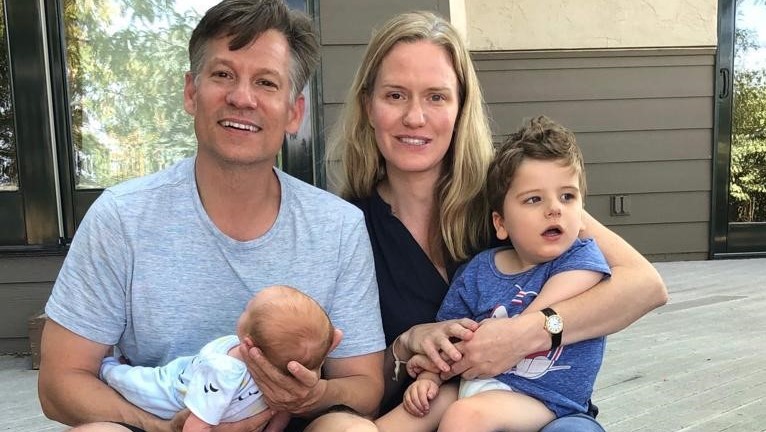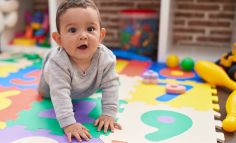Health Topics

Weathering a rare childhood disorder
Reporter Richard Engel shares his family's experience
As a chief foreign correspondent for NBC News over the past 15 years, Richard Engel has covered wars and conflicts around the world. The Peabody and Emmy Awards winner has faced dangerous and tense conditions to bring viewers reporting from Ukraine, Syria, Iran, and Afghanistan. Multiple journalism organizations have honored Engel for his courageous reporting in war zones. But in August 2022, he faced a different life challenge that proved even more difficult: He and his wife lost their 6-year-old son Henry, who was born with a rare genetic disorder called Rett syndrome.
They have since become advocates for others facing similar challenges. Engel talked with NIH MedlinePlus Magazine about his family’s journey and the importance of rare disease research that organizations like NIH support.
Getting a diagnosis for a rare disease or disorder can sometimes be very difficult. What was your experience?
We knew almost as soon as Henry was born in 2015 that something was wrong, but what? He looked healthy and beautiful. His skin glowed. His eyes were open and bright. His organs and bodily functions ticked along. He cried, he wriggled, and he slept. He was an angel. But he seemed a little too angelic, a bit too quiet. He didn’t have the strength to suckle. He could roll over but struggled more than other babies.
After repeated checkups and routine tests, our pediatrician was baffled and suggested we make sure Henry did plenty of tummy time to strengthen his core and neck. We knew that and had been doing it. The problem was far more profound.
It was only after speaking to several doctors at different hospitals around the world that Henry eventually had a DNA test, which gave us a blueprint of his genetic code. The process took months, and even still, the geneticists were left scratching their heads. They found a disorder that they thought only occurred in girls—a genetic variant that causes Rett syndrome, a devastating disease that leads to severe cognitive and physical impairments. We learned that boys can also have a variant of the same gene and have their own version of Rett syndrome, and it can be even more severe.
How did Henry’s condition progress?
Our angel kept missing milestones. He could crawl a bit and feed himself, and he loved to giggle and play. He recognized us and could say a few words. He said “Dada” and “I love you.” I will never hear sweeter words for the rest of my life. Henry’s condition worsened over time; his development regressed and sharply declined in 2022. He passed away last August.
Why did you decide to speak out and tell your family’s experience?
My wife Mary and I decided early on we wanted to share our experience so more doctors and families knew that boys could have a version of Rett syndrome. We wanted to reach other parents facing similar challenges and let them know that they aren’t alone. And we wanted them to know they now had two more advocates among their ranks trying to do whatever we could to help.
How is it to be a parent or loved one facing a rare disorder like Henry’s?
It is a long ride. It beats you up emotionally. Every holiday reminds you how different and more difficult your child’s life is from many others. Every conversation with friends and other parents reminds you how different your lives are, too. But you have a purpose. You’ve seen behind the curtain. You don’t have time for the small stuff. You have the double-edged gift of perspective. Our children are loved no matter how difficult their condition is—they matter most.
How can we fight the stigma associated with childhood rare disorders?
The only way to tackle the stigma is through visibility and awareness. These kids are out there. Their parents are out there. They need to go to the park as much as—and probably more than—any child. They want to laugh and play with other children, so play with them and be kind.
You’ve said that your son Henry gave you a gift. Could you speak to that?
For more than 25 years, I’ve worked as a foreign correspondent, bouncing between war zones. All wars are floods of disaster, with the occasional drop of selfless bravery and heroism. I surfed the tide of human misery, and it hardened me. It's called “compassion fatigue.” Henry broke through all of that. He cracked the armor, and it slid off. I connected with him in a way I’d never felt before. His vulnerability and the pure love in his eyes left me vulnerable, too, and restored my compassion, especially for those who have to work harder in life, which is already pretty tough for everyone.
What’s the importance of research like the studies supported by NIH?
Research is the way out of this. Henry wasn’t sick; he had a genetic typo that limited him and ultimately took everything from him. But it’s not an easy fix. You cannot just correct the glitch in his genetic code like you can in a software code and “Presto, problem solved!” We’ll get there, or at least partly there, but only through research.







